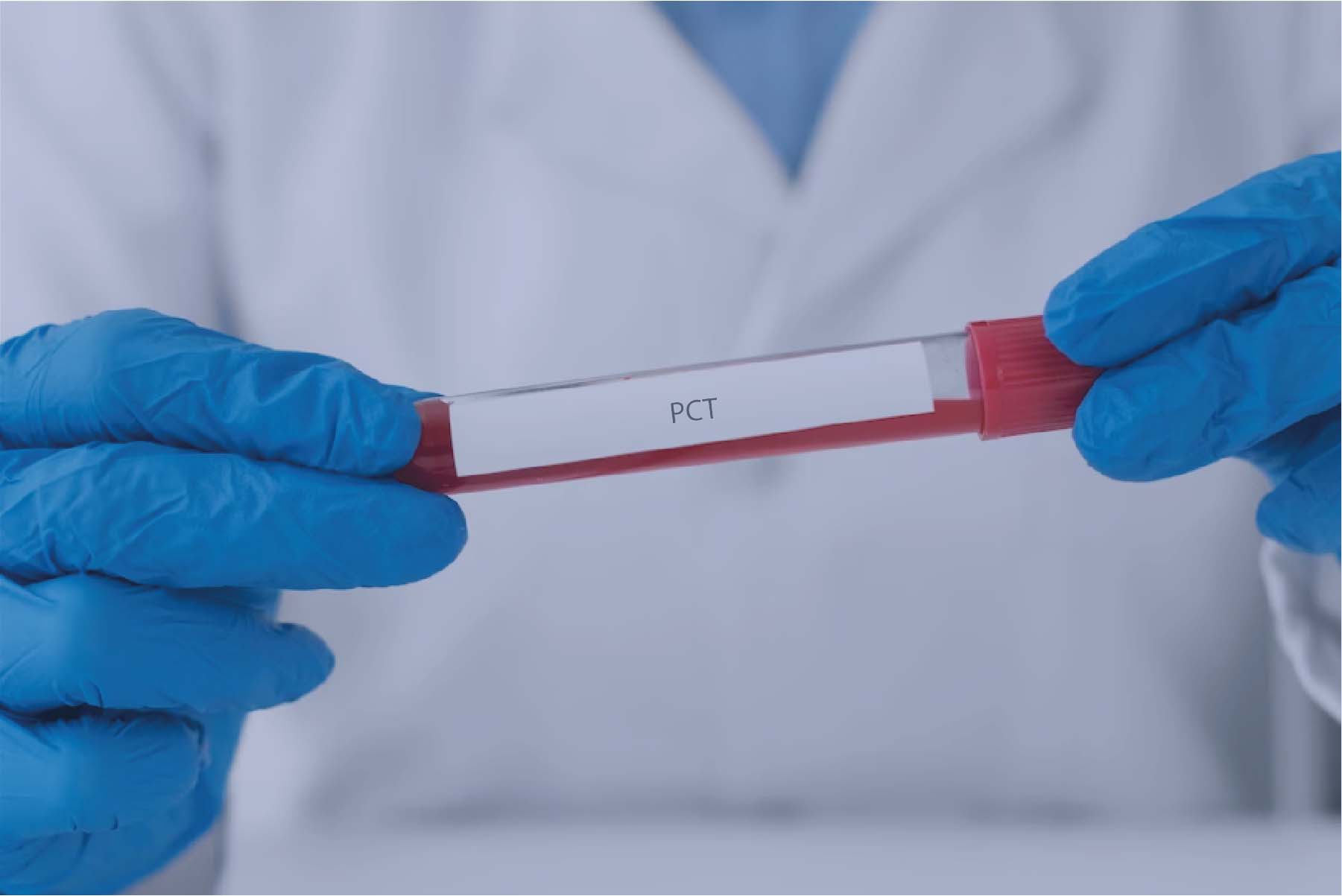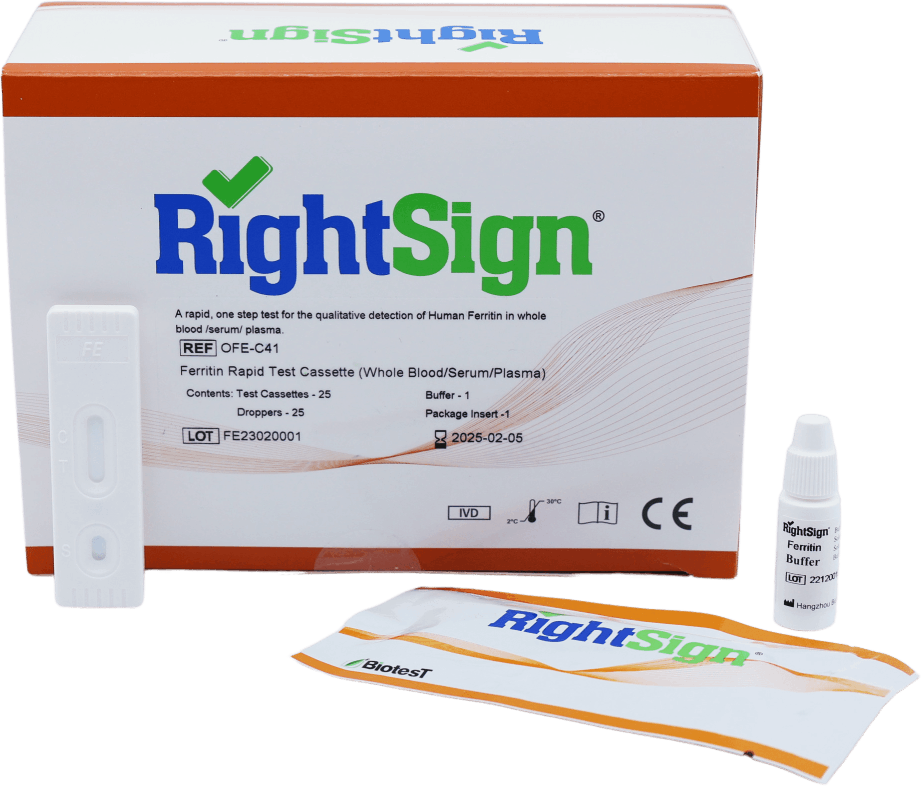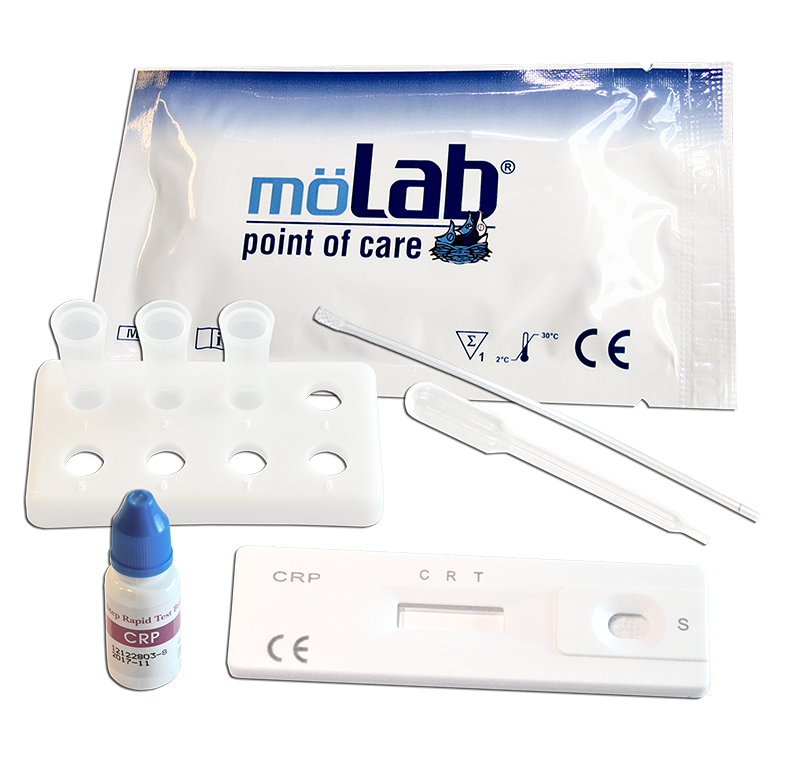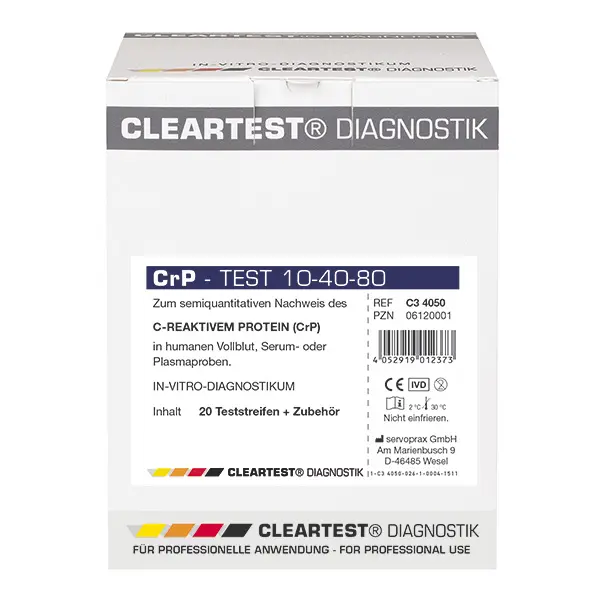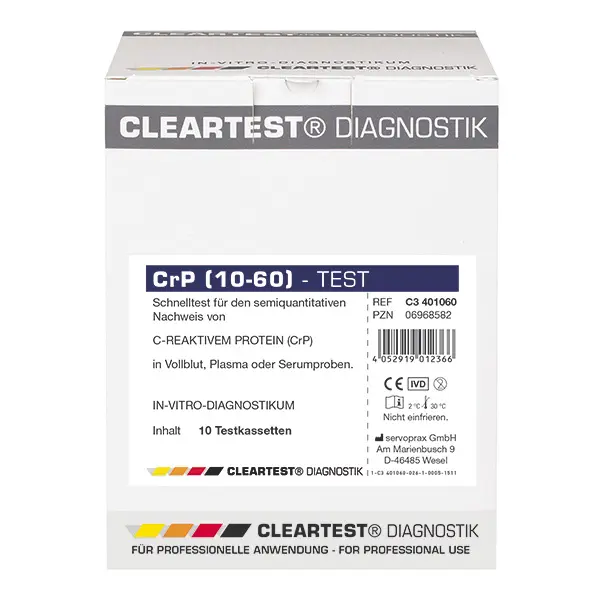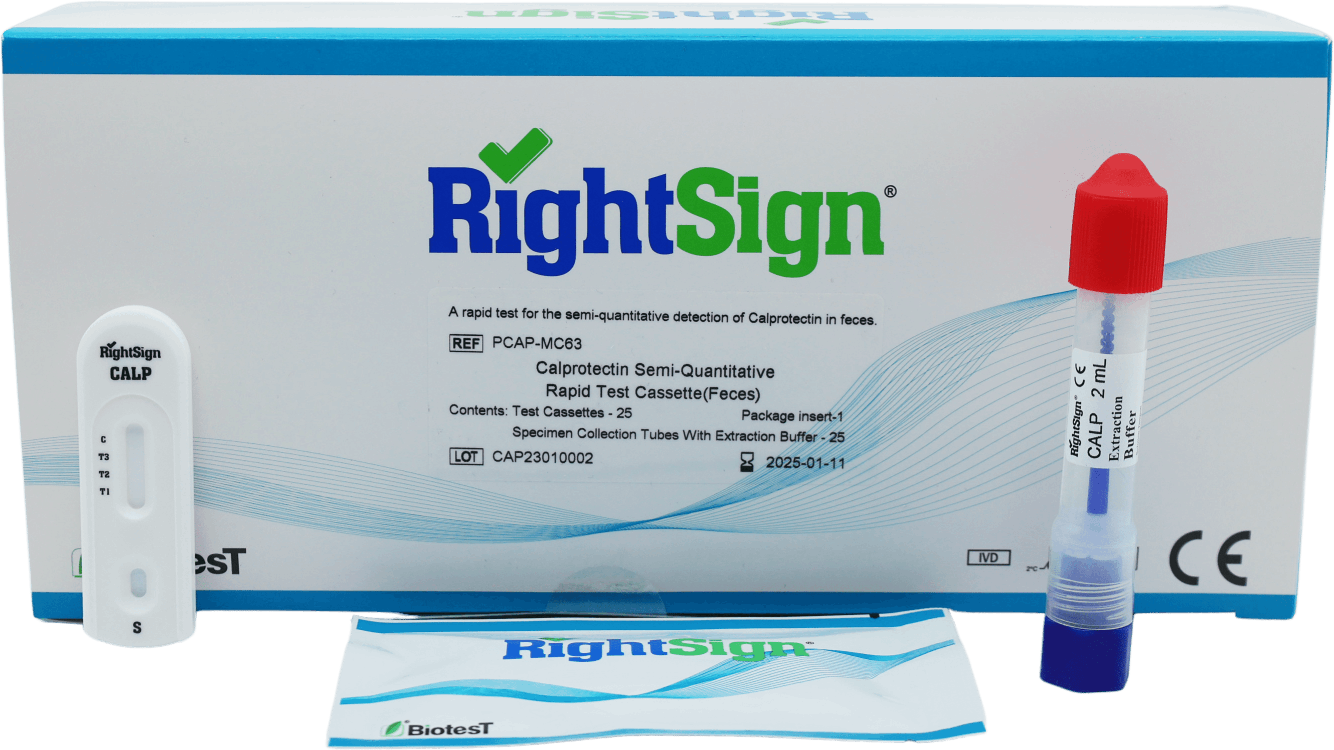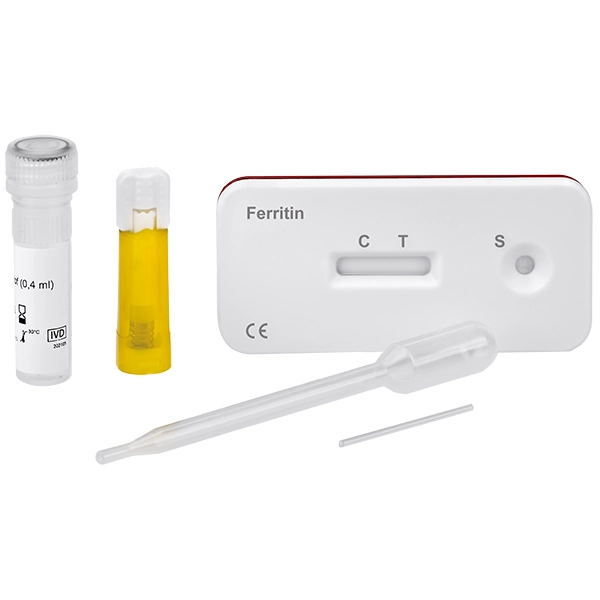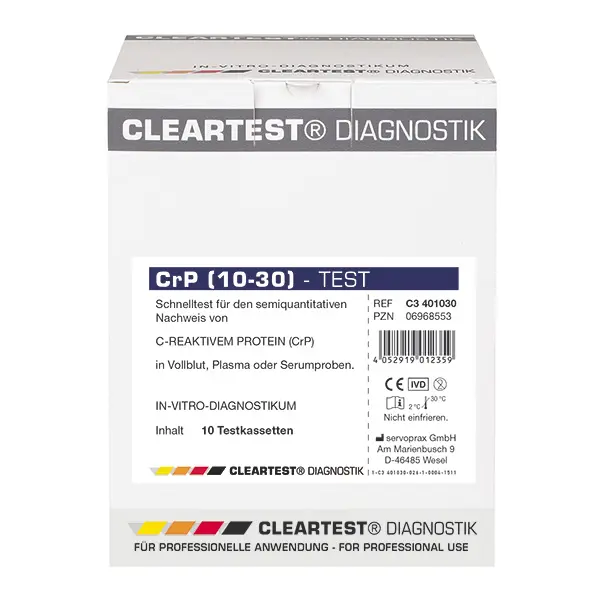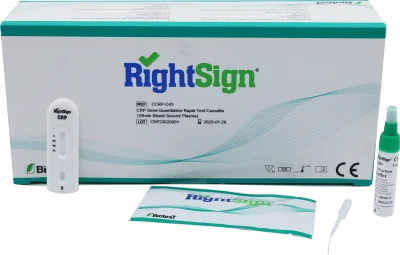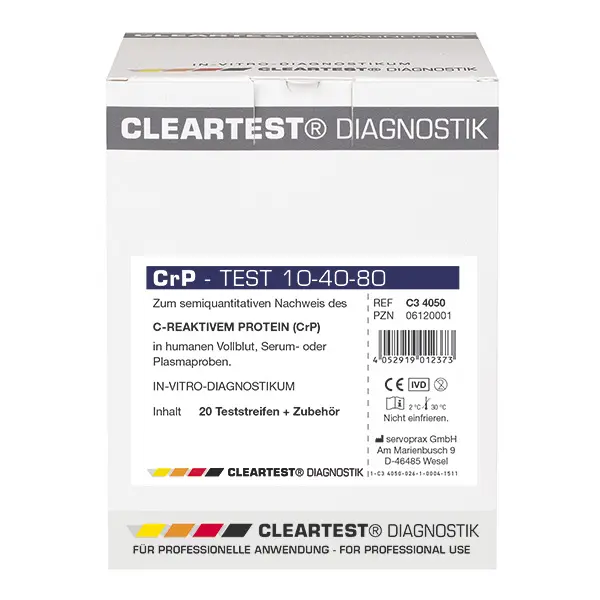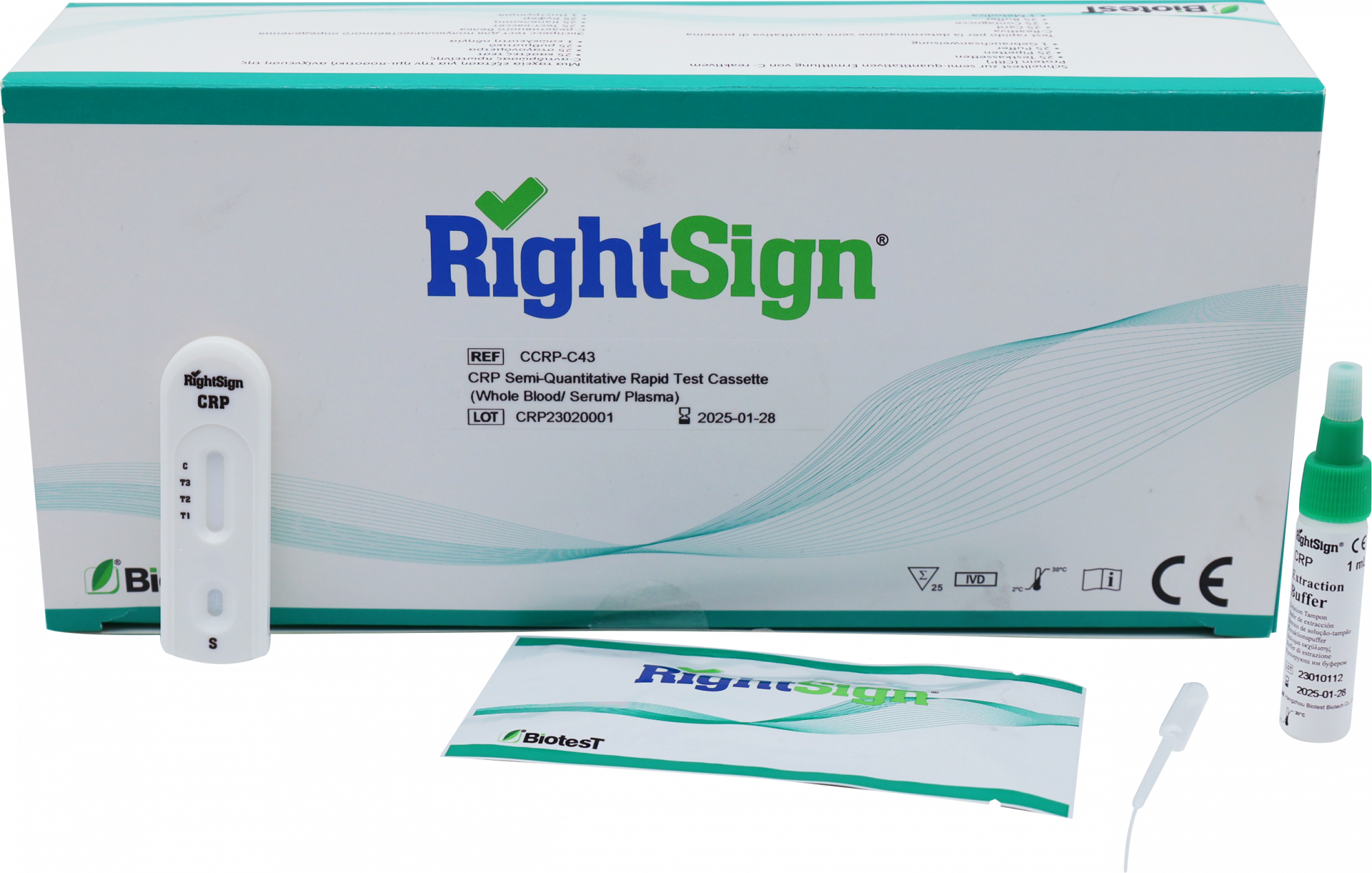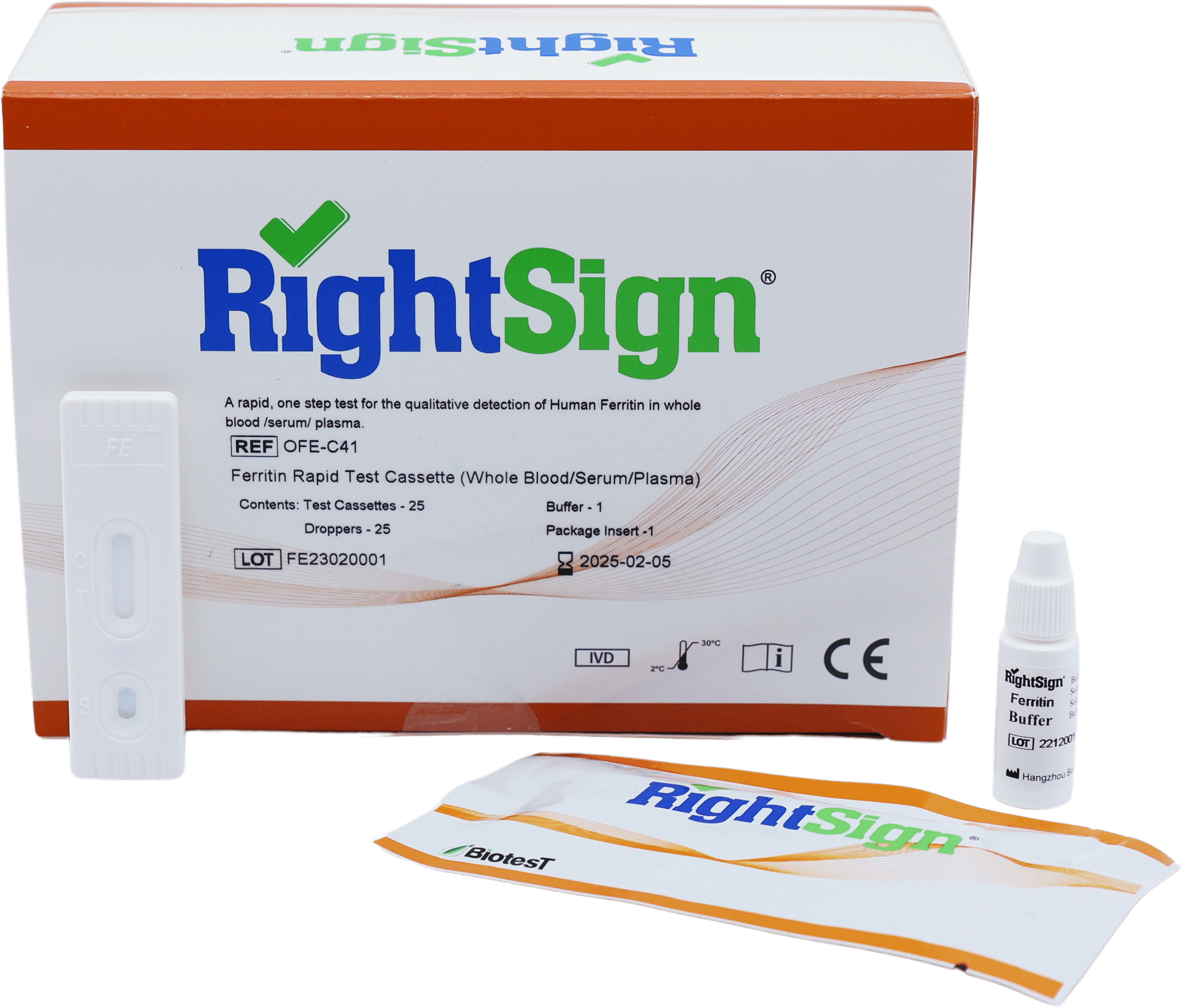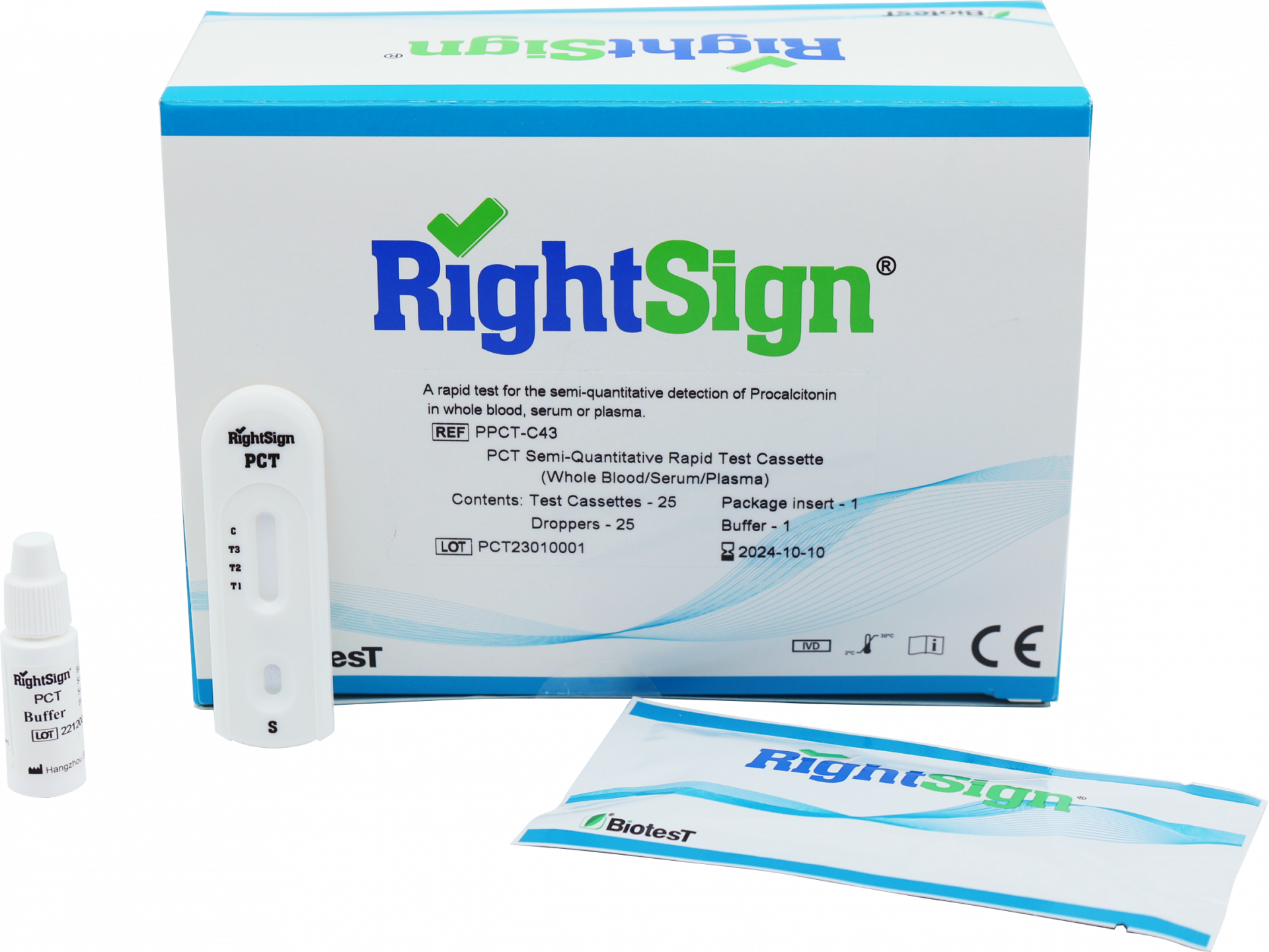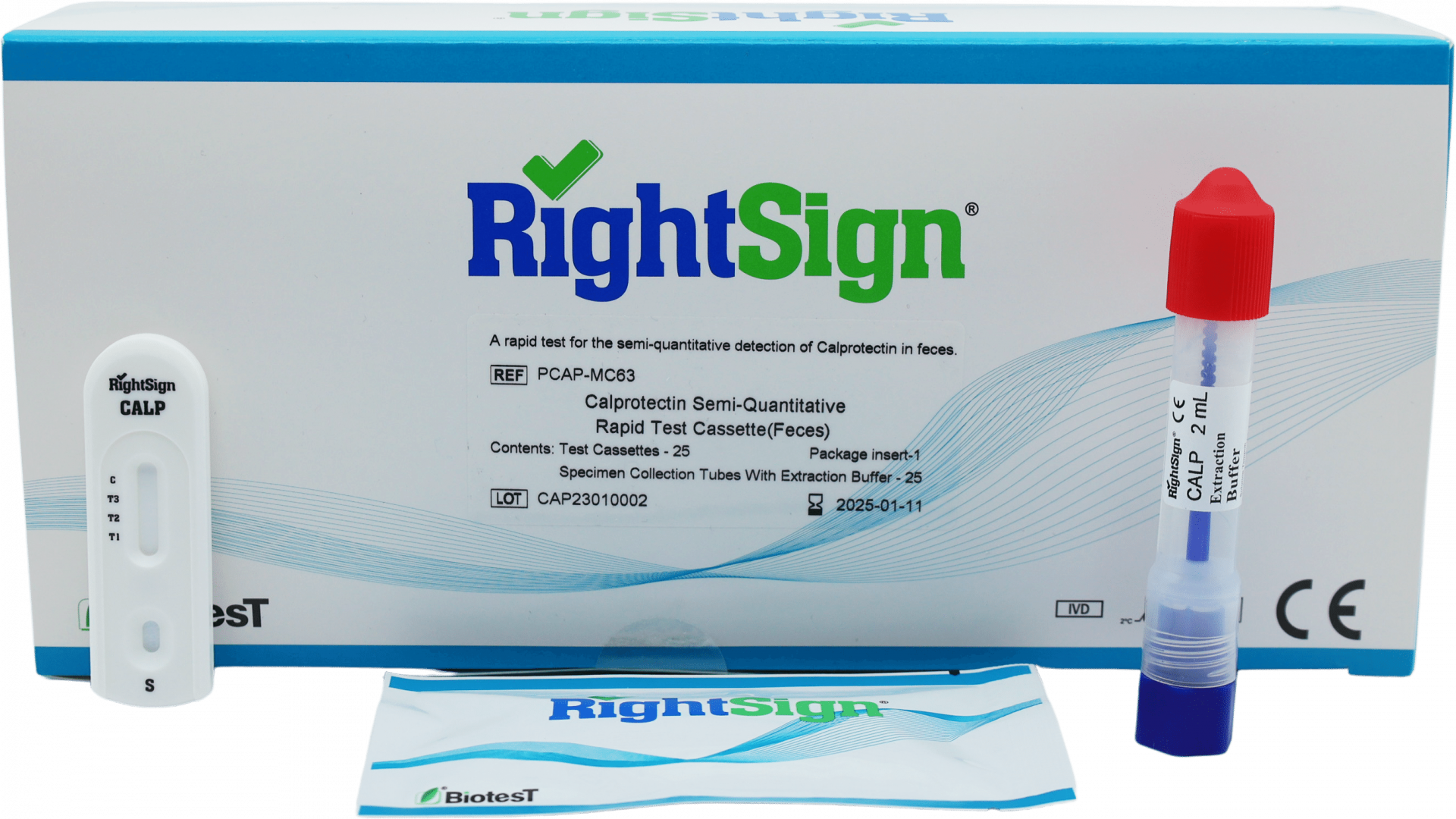Buy Inflammation Marker Tests
Our inflammation marker tests at OdemShop enable precise assessment and monitoring of inflammatory conditions. They provide valuable information for an effective treatment strategy.
Inflammation markers - Everything you need to know
Inflammatory markers are an important part of the diagnosis and treatment of many diseases. They are also essential for those who want to stay healthy. But what exactly are inflammatory markers? We explain everything you need to know about inflammatory markers in this article.
Our body is always protecting us from danger and building defenses against infection or injury. To determine whether our defenses are working or not, doctors measure certain proteins in the blood - these are the inflammation markers! These can provide information about which disease the patient has and how advanced it is. Read more about the details of inflammatory markers here!
Significance for the prognosis of heart disease
Inflammatory markers are like a barometer for cardiovascular prognosis. They give us insight into the health of the body and tell us whether it is in balance or not.
The CRP value, PCT value, and ferritin value are three inflammatory markers used as indicators of cardiovascular disease. These values help physicians diagnose disease and provide clues for the best possible treatment. Furthermore, these values provide information on which preventive measures should be taken to reduce or exclude future diseases.
Because of their importance, it is obvious why regular testing is recommended, so that people can be informed at an early stage about what is wrong with them or what might still happen.
Correlation between physical fitness
Inflammatory markers and physical fitness are closely linked. Good fitness is the foundation for a functioning immune system, while poor endurance can make the body vulnerable to chronic infections and inflammation.
To better understand the relationship between a person's fitness level and their susceptibility to inflammatory parameters, consider the following:
- C-reactive protein (CRP): CRP is an inflammatory marker measured in the blood. It helps determine whether or not someone is suffering from acute or chronic inflammation.
- Aerobic exercise programs: Regular aerobic exercise lowers CRP levels in the blood - which means you're less susceptible to inflammatory diseases.
- Muscle strength: the more developed your muscular system is, the more enzymes it produces that suppress inflammatory responses. This increases your resistance to various disease symptoms.
- Diet: A healthy diet rich in fruits and vegetables helps reduce the total number of inflammatory markers in the body, minimizing the risk of infectious diseases.
Through this information, the link between fitness and immune defense provides you with a better understanding of what factors are necessary to protect yourself from chronic infectious disease. Now that we have learned everything we need to know about the various inflammatory parameters, let's continue with 'Inflammatory parameters at a glance'.
Inflammation parameters at a glance
The connection with physical fitness has shown us: good health is a crucial factor for our overall well-being. Now let's focus on inflammatory parameters at a glance to understand which biomarkers and blood cells are involved.
Inflammatory markers or biomarkers are substances that can be measured in body fluids and are usually produced in response to inflammatory processes. They help us detect inflammatory diseases early and treat them better. These include white blood cells (leukocytes) and various cytokines and interleukins.
The readings of these markers range from normal to highly elevated; depending on whether the body is trying to fight off an infectious process or not. There are many ways to determine the status of the immune system based on these levels. Therefore, inflammatory markers play a key role in the diagnosis and treatment of diseases - especially those associated with chronic inflammatory diseases.
They can also be used to easily determine whether therapies are effective and whether further investigations should be recommended to the patient.
When are elevated levels of inflammation in the blood?
The most commonly used indicators of inflammation in the body are:
• White blood cells: These cells boost the immune system.
• Inflammatory markers: These indicate specific substances that are highly present in inflammatory diseases.
• Blood sampling to determine the level of CRP: This is the most important inflammatory value of all.
It is therefore advisable to check one's health status regularly and, if in doubt, to visit the doctor to investigate further with the help of laboratory values. This is especially true if you are symptom-free but notice unexplainable abnormalities in your body.
In this way, symptoms of disease can often be diagnosed at an early stage, which in turn leads to an effective treatment concept. With this knowledge, we now move on to the CRP value: The most important inflammation value!
CRP value: The most important inflammation value
If you want to know about inflammatory markers, then it is essential to know the CRP value. It provides a direct measure of the intensity and acuteness of the inflammatory process, thus giving us insight into the body's immune response.
Although this metric can only be determined in the laboratory, it provides significant information about the progression of disease. This biomarker has the ability to map both acute and chronic inflammation and is therefore considered particularly sensitive. Therefore, it is often administered to patients with suspected infection or other conditions to provide more accurate diagnoses.
Due to its high diagnostic value, the CRP value offers an excellent opportunity to monitor the health development of a person and, if necessary, to take countermeasures in time.
Blood Sedimentation Rate (BSG): Faster with Inflammation
In inflammation, blood sedimentation (ESR) accelerates the healing process.
Blood Sedimentation (ESR): In inflammation, the rate of blood sedimentation accelerates as the body produces a protein to fight the disease. This process can be measured:
- The increased amount of protein in the blood.
- The number of leukocytes is higher than normal.
- The sedimentation rate of the blood increases significantly.
The readings help physicians and other healthcare professionals diagnose inflammation and assess its severity and progress. Therefore, ESR measurement provides important information for making the best possible therapeutic decisions for the benefit of the patient.
In addition, there are specially developed tests that can be used to quickly determine whether or not inflammation levels are elevated due to leukocytes.
Inflammation values: Elevated leukocytes
Elevation of leukocyte levels in the blood is an important inflammatory marker recorded in various diseases. When white blood cell levels are within the normal range, they indicate a healthy condition.
However, a large deviation from this standard value may indicate that your body is under stress and subject to inflammation. There are many ways to determine the level of recorded inflammatory markers, but measuring leukocyte levels remains an effective method in this regard.
Thus, changes in leukocyte levels can be used to determine whether or not you are facing inflammatory problems. Therefore, it is a good idea to take tests regularly so that you can detect potential problems early and treat them accordingly.
This way, you can minimize potential health risks and ensure greater overall wellness. Moving on to the topic of HSCRP - Knowing Inflammatory Markers, we will now go into detail about the importance of these values as well as methods of their determination.
HsCRP - Learn about the inflammatory marker
Fortunately, you can have another inflammatory marker tested to better understand your health: high-sensitivity c-reactive protein (hsCRP). This is an important biomarker in the nerve fluid and blood serum - it tells you the level of inflammation in your body.
The doctor can determine the level of hsCRP with a simple blood test. An increase in this marker indicates inflammatory processes, which usually occur only in serious diseases. Therefore, it is worth analyzing it regularly in addition to other tests.
Furthermore, it is possible to determine inflammation levels in stool or urine as an indicator of systemic inflammatory processes using special test kits. There are therefore various ways to identify potential systemic inflammation at an early stage and thus derive appropriate treatment options in good time.
The earlier you identify risks and take action, the more chances you have for an optimal recovery.
Conclusion
In conclusion, we can say that inflammation levels can be an important indicator of the body's health status. It is important to understand the difference between CRP and hsCRP levels, as well as the impact of elevated inflammation levels on the prognosis of cardiovascular disease.
In addition, there is evidence that elevated inflammation levels may become prominent before the onset of AD. To better interpret test results, you should always talk to your doctor.
There are several ways to lower our inflammation levels. A healthy diet and regular exercise are particularly helpful in this regard. Stress management techniques also help strengthen our immune system and keep our inflammation levels low.
Overall, it must be said: knowing our inflammation markers is hugely important! We should all take responsibility for our well-being and strive to find out more about this topic - so we can stay fit and prevent illness or treat it sooner.
Here you can find our inflammation markers:
FAQ's
What are inflammatory markers?
Inflammatory markers are proteins produced by the body to respond to an inflammatory response in the body. They can be measured in the blood and provide information about the extent of the inflammatory response.
What are the inflammatory markers?
There are a variety of inflammatory markers, such as CRP (C-reactive protein), interleukin-6 (IL-6), and TNF-alpha.
Why are inflammatory markers measured?
Inflammatory markers are measured to determine if an inflammatory response is occurring in the body. They can help identify the cause of inflammation and also monitor the progression of a disease.
How are inflammatory markers measured?
Inflammatory markers are measured in the blood. A blood sample is taken and analyzed in the laboratory.
How quickly do inflammatory markers respond to an inflammatory response?
Inflammatory markers can rise within hours to days after the onset of an inflammatory response.
Can inflammatory markers also be elevated in chronic disease?
Yes, inflammatory markers can also be elevated in chronic diseases such as rheumatism or diabetes.
What is the implication of an increased level of inflammatory markers?
An elevated inflammatory marker may indicate an inflammatory response in the body. However, there may be other causes, such as infection or trauma.
How can inflammatory markers be lowered?
Inflammatory markers can be lowered by treating the underlying condition. A healthy lifestyle, such as a balanced diet, adequate exercise, and stress management, can also help reduce inflammatory responses.
Are elevated inflammatory markers always an indication of disease?
No, not always. An elevated inflammatory marker can also be triggered by other factors, such as smoking or stress.
Can inflammatory markers also be used to prevent disease?
Inflammation markers can provide indications of an increased risk of certain diseases. Targeted prevention can then help to reduce the risk.
What is the difference between CRP and hsCRP levels?
CRP is an inflammatory marker that indicates active inflammation, while hsCRP acts as a measure of the person's potential to suffer from atherosclerotic disease. In other words, CRP measures the presence of inflammation and hsCRP predicts potential problems in the future.
Can elevated inflammation levels be noticeable before the onset of Alzheimer's?
Although researchers do not yet know exactly why Alzheimer's is often seen before the onset of elevated inflammation levels, they believe it could be a clue to brain deterioration. However, there are several studies that suggest it may be possible to lower the risk of Alzheimer's with the detection of early signs of inflammatory markers. While further research is needed to better understand the link and learn more about predicting and preventing Alzheimer's, it can already be claimed: Early screening for inflammatory markers can help avert the risk of Alzheimer's disease in advanced age.
Das könnte Sie auch interessieren

C-Reactive Protein/CRP
C-reactive protein, also known as CRP, is an important laboratory parameter for measuring acute inflammation in the body. It has proven to be useful in diagnosing...
View Post
PCT – Everything You Need to Know
PCT is an important and versatile parameter that plays an important role in the diagnosis and therapy of various diseases. Therefore, it is important...
View Post
What is Ferritin?
Have you ever heard of ferritin? It is an essential body component and we all need to pay attention to it. But what is it exactly? In this article,...
View Post
